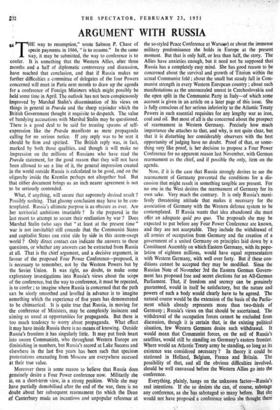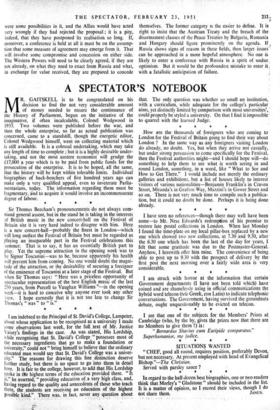ARGUMENT WITH RUSSIA
gig HE way to resumption." wrote Salmon P. Chase of specie payments in 1866, " is to resume." In the same way, it may be submitted, the way to conference is to confer. It is something that the Western Allies, after three months and a half of diplomatic controversy and discussion, have reached that conclusion, and that if Russia makes no further difficulties a committee of delegates of the four Powers concerned will meet in Paris next month to draw up the agenda for a conference of Foreign Ministers which might possibly be held some time in April. The outlook has not been conspicuously improved by Marshal Stalin's dissemination of his views on things in general in Pravda and the sharp rejoinder which the British Government thought it requisite to despatch. The value of bandying accusations with Marshal Stalin may be questioned. There is a good deal to be said for treating spasms of self- expression like the Pravda manifesto as mere propaganda calling for no serious notice. If any reply was to be sent it should be firm and spirited. The British reply was, in fact, marked by both those qualities, and though it will make no Impression on the millions of Russians who have read the Pravda statement, for the good reason that they will not have been allowed to see a line of it, the general impression created in the world outside Russia is calculated to be good, and on the oligarchy inside the Kremlin perhaps not altogether bad. But that either document brings us an inch nearer agreement is not to be seriously contended.
What, if anything, will secure that supremely desired result ? Possibly nothing. That gloomy conclusion may have to be con- templated. Russia's ultimate purpose is as obscure as ever. Are her territorial ambitions insatiable ? Is she prepared in the last resort to attempt to secure their realisation by war ? Does Marshal Stalin (who says that " at least at the present time " war is not inevitable) still concede that the Communist States and capitalist States can exist side by side in this storm-swept world ? Only direct contact can indicate the answers to these questions, or whether any answers can be extracted from Russia at all. That is the chief argument, and a decisive argument, in favour of the proposed Four Power Conference—proposed, it is necessary to remember, not by the Western Powers but by the Soviet Union. It was right, no doubt, to make some exploratory investigations into Russia's views about the scope of the conference, but the way to conference, it must be repeated, is to confer ; to imagine where Russia is concerned that the path can be nicely smoothed and levelled in advance is to imagine something which the experience of five years has demonstrated to be chimaerical. It is quite true that Russia, in moving for the conference of Ministers, may be completely insincere and aiming as usual at opportunities for propaganda. But there is too much tendency to worry about propaganda. What effect it may have inside Russia there is no means of knowing. Outside Russia's frontiers it has singularly little. It may put fresh heart into sworn Communists, who throughout Western Europe are diminishing in numbers, but Russia's record at Lake Success and elsewhere in the last five years has been such that specious protestations emanating from Moscow are everywhere assessed at their true value.
Moreover there is some reason to believe that Russia does genuinely desire a Four Power conference now. Militarily she is, on a short-term view, in a strong position. While she may have partially demobilised after the end of the war, there is no doubt about her subsequent rearmament (to which the Dean Of Canterbury made an incautions and unpopular reference at the so-styled Peace Conference at Warsaw) or about the immense military predominance she holds in Europe at the present moment. But that is only half, or less than half, the story. The Allies have anxieties enough, but it need not be supposed that Russia has a completely easy mind. She has good reason to be concerned about the survival and growth of Titoism within the actual Communist fold ; about the small but steady fall in Com- munist strength in every Western European country ; about such manifestations as the unconcealed unrest in Czechoslovakia and the open split in the Communist Party in Italy—of which some account is given in an article on a later page of this issue. She is fully conscious of her serious inferiority to the Atlantic Treaty Powers in such essential requisites for any lengthy war as iron, coal and oil. But most of all is she concerned about the prospect of rearmament in Western Germany. Precisely how much importance she attaches to that, and why, is not quite clear, but that it is disturbing her considerably observers with the best opportunity of judging have no doubt. Proof of that, or some- thing very like proof, is her decision to propose a Four Power Conference for no apparent reason last November, with German rearmament as the chief, and if possible the only, item on the agenda.
Now, if it is the case that Russia strongly desires to see the rearmament of Germany prevented the conditions for a dis- cussion that might result in something tangible are present. For no one in the West desires the rearmament of Germany for its own sake. Very much the contrary. It is only Russia's mani- festly threatening attitude that makes it necessary for the association of Germany with the Western defence system to be contemplated. If Russia wants that idea abandoned she must offer an adequate quid pro quo. The proposals she may be expected to put before any Four Power Conference are known, and they are not acceptable. They include the withdrawal of all armies of occupation from Germany and the creation of a government of a united Germany on principles laid down by a Constituent Assembly on which Eastern Germany, with its popu- lation of eighteen millions, would have equal representation with Western Germany, with well over forty. But if these con- ditions cannot be accepted they may be modified. Since the Russian Note of November 3rd the Eastern German Govern- ment has proposed free and secret elections for an All-German Parliament. That, if freedom and secrecy can be genuinely guaranteed, would in itself be satisfactory, but the nature and powers of such a body would clearly have to be agreed. The natural course would be the extension of the basis of the Parlia- ment which already represents more than two-thirds of Germany ; Russia's views on that should be ascertained. The withdrawal of the occupation forces cannot be excluded from discussion, though it is certain that, in the existing political situation, few Western Germans desire such withdrawal. It would mean that Communist forces, on the soil of Russia's satellites, would still be standing on Germany's eastern frontier. Where would an Atlantic Treaty army be standing, so long as its existence was considered necessary ? In theory it could be stationed in Holland, Belgium, France and Britain. The possibility of that, and all the obvious difficulties involved, should be well canvassed before the Western Allies go into the conference.
Everything, plainly, hangs on the unknown factor—Russia's real intentions. If she so desires she can, of course, sabotage any conference, as she has sabotaged so many before. But she would not have proposed a conference unless she thought there were some possibilities in it, and the Allies would have acted very wrongly if they had rejected the proposal ; it is a pity, indeed, that they have postponed its realisation so long. If, moreover, a conference is held at all it must be on the assump- tion that some measure of agreement may emerge from it. That will involve some compromise and concession on either side. The Western Powers will need to be clearly agreed, if they are not already, on what they need to exact from Russia and what, in exchange for value received, they are prepared to concede themselves. The former category is the easier to define. It is right to insist that the Austrian Treaty and the breach of the disarmament clauses of the Peace Treaties by Bulgaria, Rumania and Hungary should figure prominently on the agenda. If Russia shows signs of reason in these fields, then larger issues can be approached in a more hopeful atmosphere. No one is likely to enter a conference with Russia in a spirit of undue optimism. But it would be the profoundest mistake to enter it with a fatalistic anticipation of failure.







































 Previous page
Previous page